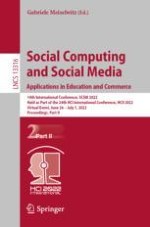
2022 | OriginalPaper | Buchkapitel
Design and Evaluation of a Programming Tutor Based on an Instant Messaging Interface
verfasst von : Claudio Alvarez, Luis A. Rojas, Juan de Dios Valenzuela
Erschienen in: Social Computing and Social Media: Applications in Education and Commerce
Aktivieren Sie unsere intelligente Suche, um passende Fachinhalte oder Patente zu finden.
Wählen Sie Textabschnitte aus um mit Künstlicher Intelligenz passenden Patente zu finden. powered by
Markieren Sie Textabschnitte, um KI-gestützt weitere passende Inhalte zu finden. powered by